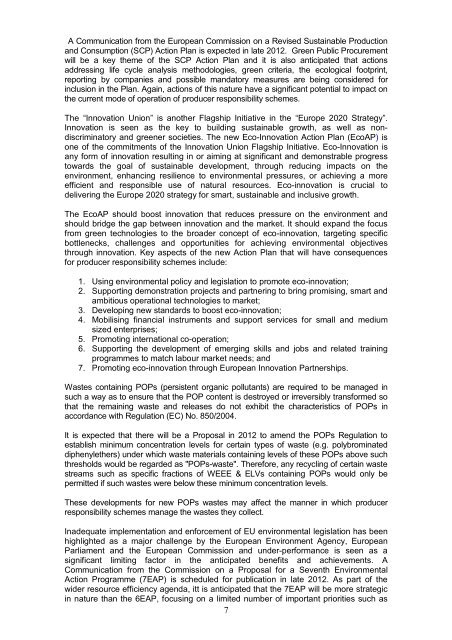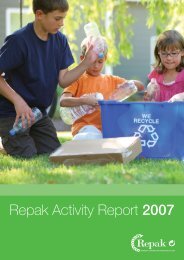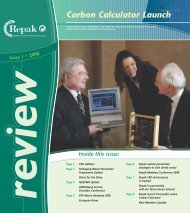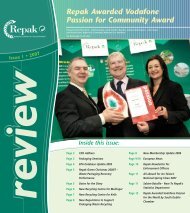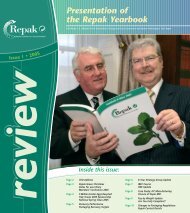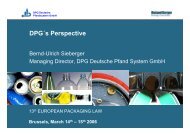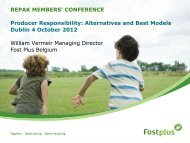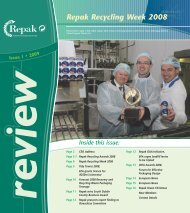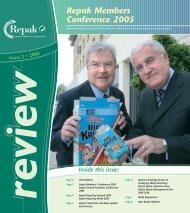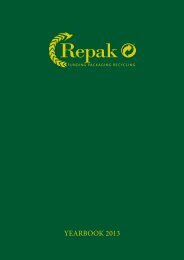Review Of The Producer Responsibility Initiative Model In ... - Repak
Review Of The Producer Responsibility Initiative Model In ... - Repak
Review Of The Producer Responsibility Initiative Model In ... - Repak
You also want an ePaper? Increase the reach of your titles
YUMPU automatically turns print PDFs into web optimized ePapers that Google loves.
A Communication from the European Commission on a Revised Sustainable Production<br />
and Consumption (SCP) Action Plan is expected in late 2012. Green Public Procurement<br />
will be a key theme of the SCP Action Plan and it is also anticipated that actions<br />
addressing life cycle analysis methodologies, green criteria, the ecological footprint,<br />
reporting by companies and possible mandatory measures are being considered for<br />
inclusion in the Plan. Again, actions of this nature have a significant potential to impact on<br />
the current mode of operation of producer responsibility schemes.<br />
<strong>The</strong> “<strong>In</strong>novation Union” is another Flagship <strong><strong>In</strong>itiative</strong> in the “Europe 2020 Strategy”.<br />
<strong>In</strong>novation is seen as the key to building sustainable growth, as well as nondiscriminatory<br />
and greener societies. <strong>The</strong> new Eco-<strong>In</strong>novation Action Plan (EcoAP) is<br />
one of the commitments of the <strong>In</strong>novation Union Flagship <strong><strong>In</strong>itiative</strong>. Eco-<strong>In</strong>novation is<br />
any form of innovation resulting in or aiming at significant and demonstrable progress<br />
towards the goal of sustainable development, through reducing impacts on the<br />
environment, enhancing resilience to environmental pressures, or achieving a more<br />
efficient and responsible use of natural resources. Eco-innovation is crucial to<br />
delivering the Europe 2020 strategy for smart, sustainable and inclusive growth.<br />
<strong>The</strong> EcoAP should boost innovation that reduces pressure on the environment and<br />
should bridge the gap between innovation and the market. It should expand the focus<br />
from green technologies to the broader concept of eco-innovation, targeting specific<br />
bottlenecks, challenges and opportunities for achieving environmental objectives<br />
through innovation. Key aspects of the new Action Plan that will have consequences<br />
for producer responsibility schemes include:<br />
1. Using environmental policy and legislation to promote eco-innovation;<br />
2. Supporting demonstration projects and partnering to bring promising, smart and<br />
ambitious operational technologies to market;<br />
3. Developing new standards to boost eco-innovation;<br />
4. Mobilising financial instruments and support services for small and medium<br />
sized enterprises;<br />
5. Promoting international co-operation;<br />
6. Supporting the development of emerging skills and jobs and related training<br />
programmes to match labour market needs; and<br />
7. Promoting eco-innovation through European <strong>In</strong>novation Partnerships.<br />
Wastes containing POPs (persistent organic pollutants) are required to be managed in<br />
such a way as to ensure that the POP content is destroyed or irreversibly transformed so<br />
that the remaining waste and releases do not exhibit the characteristics of POPs in<br />
accordance with Regulation (EC) No. 850/2004.<br />
It is expected that there will be a Proposal in 2012 to amend the POPs Regulation to<br />
establish minimum concentration levels for certain types of waste (e.g. polybrominated<br />
diphenylethers) under which waste materials containing levels of these POPs above such<br />
thresholds would be regarded as "POPs-waste". <strong>The</strong>refore, any recycling of certain waste<br />
streams such as specific fractions of WEEE & ELVs containing POPs would only be<br />
permitted if such wastes were below these minimum concentration levels.<br />
<strong>The</strong>se developments for new POPs wastes may affect the manner in which producer<br />
responsibility schemes manage the wastes they collect.<br />
<strong>In</strong>adequate implementation and enforcement of EU environmental legislation has been<br />
highlighted as a major challenge by the European Environment Agency, European<br />
Parliament and the European Commission and under-performance is seen as a<br />
significant limiting factor in the anticipated benefits and achievements. A<br />
Communication from the Commission on a Proposal for a Seventh Environmental<br />
Action Programme (7EAP) is scheduled for publication in late 2012. As part of the<br />
wider resource efficiency agenda, itt is anticipated that the 7EAP will be more strategic<br />
in nature than the 6EAP, focusing on a limited number of important priorities such as<br />
7


